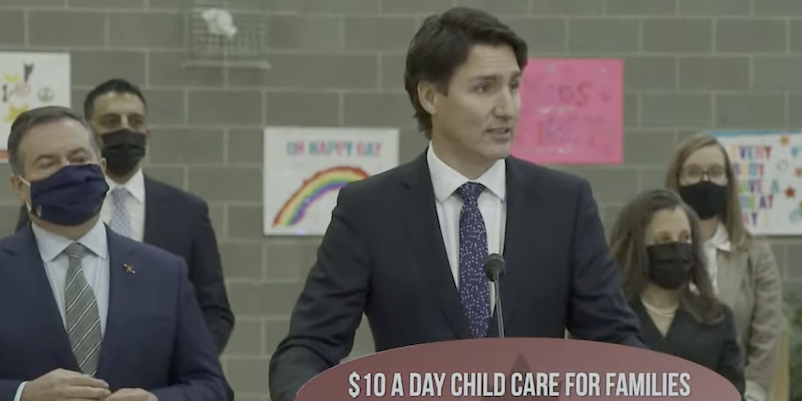Premier Jason Kenney didn’t look all that cheerful at yesterday’s announcement Alberta had finally signed on to participate in the Trudeau government’s national $10-a-day child-care program.
While the premier fidgeted in the background, Prime Minister Justin Trudeau and the other federal Liberal politicians at the morning news conference in Edmonton seemed genuinely delighted that $3.8 billion in federal money will come Alberta’s way over five years to pay for community-based early learning and child care.
The agreement will create 42,500 new regulated child care spaces in Alberta by the end of March 2026, according the news release put out by the Prime Minister’s Office. “Alberta will also see a 50 per cent reduction in average parent fees for children under the age of six in regulated child care by the end of 2022,” it added.
The province’s press release made much the same points, but tried to spin them as if they were the Kenney government’s idea.
For his part, Kenney doubtless had other things on his mind — not least that 22 of his United Conservative Party’s constituency associations have now passed a special motion calling for an early review of his leadership before March 1. They announced it just a couple of hours before the news conference. In fairness, that would distract any premier.
But why wouldn’t the prime minister, Finance Minister Chrystia Freeland, Families Minister Karina Gould and Tourism Minister Randy Boissonnault — the MP for Edmonton Centre — be pleased with themselves? Despite the presence of Kenney and Alberta Children’s Services Minister Rebecca Schulz, this was clearly a federal show.
Plus, they know the child-care program is going to be popular everywhere in Canada, and they can be confident they’re going to get the credit for it.
And every one of them knew that during the recent federal election campaign Kenney had disdainfully dismissed their plan as “cookie-cutter, nine-to-five, urban, government and union-run institutional daycare options” while touting federal Conservative leader Erin O’Toole’s boutique tax break tarted up as child care.
And they also know that, like medicare, once it is established, the national child-care program is going to be difficult for ideological free marketers like Kenney to dismantle, no matter how much they hate it.
Which is surely part of why Alberta’s government worked so hard to stall a deal with the federal government until after the Sept. 20 national election in the hope enough Conservatives would be elected to stop it in its tracks.
Ruefully admitting he couldn’t leave $3.8 billion of what he rather tendentiously described as already belonging to Albertan taxpayers on the table, Kenney tried hard to act the part of a forceful advocate for Alberta, claiming that the province fought hard to include already operating private, for-profit child-care centres in the agreement. Perhaps because of his distraction, he came across as petulant.
It can’t have pleased the premier, having complained in response to a reporter’s question that Alberta didn’t get as much flexibility in its agreement with Ottawa as did Quebec, to be firmly set straight by the prime minister, sounding very much like the schoolteacher he famously once was.
“At the end of the day, it’s not the only time we see what appears to be a two-tier federation,” Kenney grumbled. “And I think the basic aspiration of Albertans is to be treated equally, to have the same powers that Quebec exercises, and to have the same treatment from the federal government, which includes unconditional funding when there are national policy goals.”
Trudeau strode to the lectern. “Allow me to respond directly to that,” he said.
“Quebec already has $10-a-day child care,” he explained. “Indeed, it’s at eight dollars and 50 cents. So, it made no sense for us to impose conditions that they have already surpassed.
“So it’s not about treating one province differently, if Alberta already had child care at $8-a-day, across the province, we would have had an approach similar to Quebec.
“So let’s not create constitutional conventions out of this,” the PM summed up. “It’s about looking at what families had, what families need, and how we get to $10-a-day child care right across the country, and that’s exactly what we did.”
As for Kenney’s biggest problem yesterday, the 22 rebel constituency associations made sure copies of their letter to UCP party president Ryan Becker were in the hands of media before the news conference. It’s reasonable to assume most, if not all, of the MLAs from the 22 ridings support the idea of a snap review for Kenney, who is now unpopular enough with voters to put their re-election chances at risk.
Nevertheless, the premier gamely attempted to insist all is well. “I do believe, actually, that the vast majority of folks in my party are united around our common values and goals,” he responded, rather aspirationally, to a reporter’s question during the news conference.
Meanwhile, O’Toole, having lost September’s federal election to Trudeau, was experiencing difficulties similar to Kenney’s yesterday.
Saskatchewan Senator Denise Batters took to Facebook to tout a petition to force O’Toole to face a leadership review of his own. The petition is said to be part of a broader campaign to dislodge the federal opposition leader, which will continue in the days ahead.
Trudeau declined to comment on the Conservative leader’s troubles, but he couldn’t resist a gentle jab. “What I will comment on is the federal Liberals have never been so united and focused on delivering for Canadians concretely, as we’ve shown today with this child-care agreement.”




